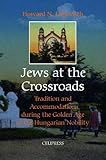Jews at the Crossroads : Tradition and Accomodation during the Golden Age of the Hungarian Nobility / Howard N. Lupovitch.
Material type: TextPublisher: Budapest ; New York : Central European University Press, [2022]Copyright date: ©2007Description: 1 online resource (306 p.)Content type:
TextPublisher: Budapest ; New York : Central European University Press, [2022]Copyright date: ©2007Description: 1 online resource (306 p.)Content type: - 9786155211317
- Capitalism -- Europe, Eastern
- Jewish leadership -- Hungary -- Miskolc -- History
- Jews -- Emancipation -- Hungary -- Miskolc
- Jews -- Hungary -- Miskolc -- History -- 18th century
- Jews -- Hungary -- Miskolc -- History -- 19th century
- Jews -- Hungary -- Miskolc -- Politics and government -- 18th century
- Jews -- Hungary -- Miskolc -- Politics and government -- 19th century
- Post-communism -- Europe, Eastern
- SOCIAL SCIENCE / Jewish Studies
- 18th century, 19th century, Education, Ethnic relations, Jews, Political studies, Religion, Zionism
- 943.9/9 22
- DS135.H92 M575 2007
- online - DeGruyter
| Item type | Current library | Call number | URL | Status | Notes | Barcode | |
|---|---|---|---|---|---|---|---|
 eBook
eBook
|
Biblioteca "Angelicum" Pont. Univ. S.Tommaso d'Aquino Nuvola online | online - DeGruyter (Browse shelf(Opens below)) | Online access | Not for loan (Accesso limitato) | Accesso per gli utenti autorizzati / Access for authorized users | (dgr)9786155211317 |
Frontmatter -- Contents -- A Note on Sources -- List of Abbreviations -- List of Tables -- Preface -- Introduction. Rethinking the Rhythms of Emancipation and Enlightenment -- Chapter 1 Eighteenth Century Pastorale: The Allures and Uncertainties of the Hungarian Frontier -- Chapter 2 Crown, Town, Magnate, and Jew: Corporate Politics in Borsod County -- Chapter 3 The Hevra Kadisha and the Rise of the Family Syndicate -- Chapter 4 Jews in the Time of Cholera: The Epidemic of 1831 and Its Aftermath -- Chapter 5 The Kehilla and the Business of Religion -- Chapter 6 Educational Reform and Religious Identity -- Chapter 7 Széchenyi’s Soup at Szemere’s Table: Miskolc Jewry and the Era of Reform, 1836–1848 -- Chapter 8 Revolution by Proxy: Jews in the Hinterland -- Chapter 9 Coming of Age, 1851–1878 -- Conclusion 1878 and Beyond: Two Chambers of One Heart -- Appendix “Words of Peace and Truth”: A Call for Unity by Moses Ezekiel Fischmann -- Bibliography -- Index
restricted access online access with authorization star
http://purl.org/coar/access_right/c_16ec
Examines the social and political history of the Jews of Miskolc-the third largest Jewish community in Hungary-and presents the wider transformation of Jewish identity during the eighteenth and nineteenth centuries. It explores the emergence of a moderate, accommodating form of traditional Judaism that combined elements of tradition and innovation, thereby creating an alternative to Orthodox and Neolog Judaism. This form of traditional Judaism reconciled the demands of religious tradition with the expectations of Magyarization and citizenship, thus allowing traditional Jews to be patriotic Magyars. By focusing on Hungary, this book seeks to correct a trend in modern Jewish historiography that views Habsburg Jewish History as an extension of German Jewish History, most notably with regard to emancipation and enlightenment. Rather than trying to fit Hungarian Jewry into a conventional Germano-centric taxonomy, this work places Hungarian Jews in the distinct contexts of the Habsburg Monarchy and the Danube Basin, positing a more seamless nexus between the eighteenth and nineteenth century. This nexus was rooted in a series of political experiments by Habsburg sovereigns and Hungarian noblemen that culminated in civic equality, and in the gradual expansion of traditional Judaism to meet the challenges of the age.
Mode of access: Internet via World Wide Web.
In English.
Description based on online resource; title from PDF title page (publisher's Web site, viewed 29. Jul 2022)


